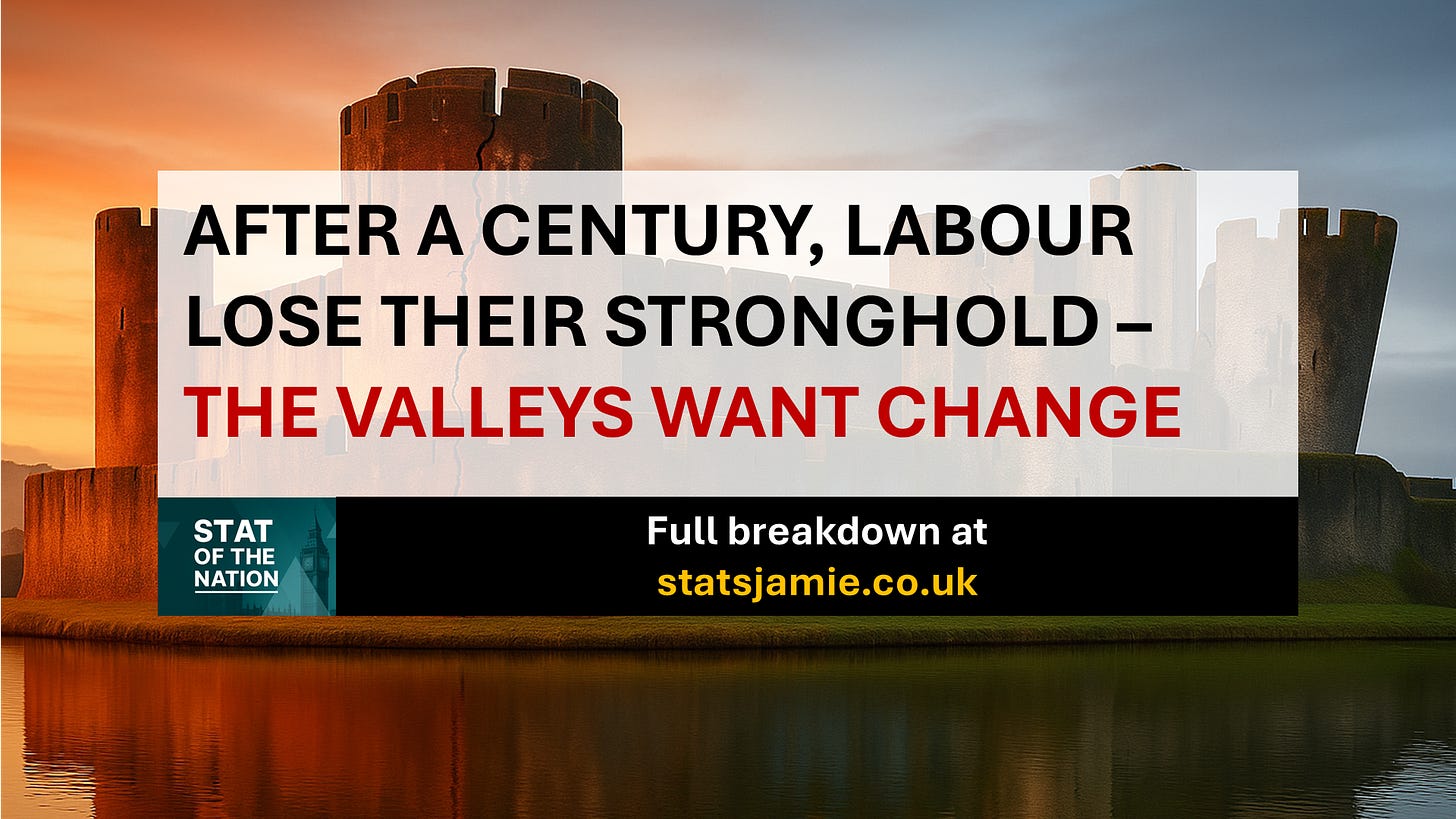After a Century, Labour Lose Their Stronghold — The Valleys Want Change
Record turnout and a historic rejection of one-party rule across the Welsh Valleys.
🗳️ Labour’s Red Fortress Falls — The Rise of Reform and the End of One-Party Wales
More than a century of political history came crashing down in Caerphilly overnight.
Labour’s grip on the Valleys has finally broken after more than 100 years of unchallenged dominance.
Plaid Cymru took the seat — but the story runs deeper.
It’s not a surge of faith in Plaid’s vision that changed the political map. It’s a collapse of confidence in Labour — and the rise of Reform UK as a genuine force across Wales.
Turnout hit 50.4% — the highest ever in a Senedd election — a clear sign that voters are now fully engaged and ready for real change.
📊 The Result — A Century-Long Record Broken
Plaid Cymru’s Lindsay Whittle won with 47.4% of the vote, but the real headline was Reform UK’s 36% — a huge step forward from previous elections and a clear signal that Reform is now the main challenger in Labour’s former heartlands.
Labour collapsed to just 11%, their worst result in living memory in a seat they once considered untouchable.
There may have been tactical voting under the current first-past-the-post system, with some voters backing Plaid purely to oust Labour.
When Wales moves to proportional representation next May, Reform’s vote share will translate far more effectively — and that could reshape the Senedd completely.
🔴 A Century of Loyalty, Rewarded with Decline
The South Wales Valleys once built Britain’s wealth — and built Labour’s power.
Born from the pits and the unions, Labour became an integral part of working-class life. For generations, voting Labour was the political equivalent of breathing.
But after 26 years of Labour rule in Cardiff Bay, Wales is falling behind in health, the economy, and education.
NHS performance is worse on many key metrics than in England, with longer waiting times and fewer patients seen on target. Wages and productivity trail the UK average, and school outcomes have fallen further behind.
The backlash over the 20mph speed limit captured the growing sense that decisions in Cardiff Bay are made for politicians, not the public. After decades of loyalty, voters have had enough.
🟢 Plaid’s Moment, Reform’s Rise
Plaid Cymru have achieved what no one thought possible: taking a Valleys seat off Labour under first-past-the-post.
Their campaign connected with voters who simply wanted change, and for many, Plaid became the vehicle for that protest.
Yet Plaid’s positions on policies like the Nation of Sanctuary and Net Zero show they remain aligned with Labour on many fronts. Whether this victory signals a deeper shift toward Plaid’s vision — or just a rejection of Labour — will be tested next May.
For Reform UK, this result marks a major step forward. Winning over a third of the vote in one of Labour’s strongest heartlands is a statement in itself. Reform is now established as a serious force in Welsh politics — and a credible challenger as the two old parties falter.
⚪ The End of One-Party Wales
Caerphilly isn’t just another constituency — it’s a symbol. The party of the miners has lost the town that the miners built.
After a century of loyalty, voters across Wales are saying the same thing: we’ve had enough of Labour, and we’re ready for change.
The era of one-party Wales is ending.
🔮 What Happens Next
Plaid’s success gives them momentum heading into next May, but it may prove fleeting if tactical votes drift elsewhere under the new system.
Reform’s advance, by contrast, suggests a longer-term realignment taking shape — one rooted in frustration with Labour’s failures and a demand for competence over ideology.
Whatever the next chapter brings, Caerphilly has rewritten Welsh political history — and the aftershocks will be felt well beyond the Valleys.
✍️ Jamie Jenkins
📚 If you found this useful, you might also want to read:
👉 Another Month, Another £20 Billion – Labour’s Borrowing Spiral Continues — how soaring borrowing and inflationary policies are pushing Britain deeper into debt while taxpayers foot the bill.
Stat of the Nation exists to cut through the spin and show the numbers as they are.
If you value clear, fact-driven analysis — please share this roundup with others. And hit subscribe below to get the stats first, every week.
📲 Follow me here for more daily updates:




I would say that my Welsh, coal-mining, staunch Labour, long dead uncle would be turning in his grave. Except I suspect he probably started spinning with the arrival of Tony Blair.
I reckon this wasn't a vote for Plaid (my uncle called them namby-pamby fantasists) but a vote against Labour - I'm not really sure about Reform either, seeing as how they are untested and could well be just another "none of the above" vote.